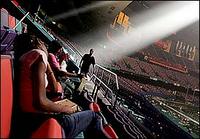"They died right here, in America, waiting for food."
The NYT reports on the arrival of fresh troops in New Orleans yesterday: 
Scores of amphibious vehicles and Humvees carrying thousands of newly dispatched armed National Guardsmen pushed through New Orleans in a daylong parade, hoping to replenish the dire needs of the stranded and to try to restore order to a city that had devolved into wantonness. In one sign of the boundless despair, police officials acknowledged that some New Orleans officers had turned in their badges, refusing to risk their lives to try to right the city.Most of the refugees have been relocated from the convention center and the Superdome. But Reuters reports that the help was too late for some:

Leroy Fouchea, 42, waited in the sweltering heat for an hour to get his ration -- his first proper food since Monday -- and immediately handed it over to a sickly friend.In the News Journal, Mike Billington reports on the arrival of 200 members of the Delaware National Guard in Gulfport, Mississippi:
He then offered to show reporters the dead bodies of a man in a wheelchair, a young man who he said he dragged inside just hours earlier, and the limp forms of two infants, one just four months old, the other six months old.
"They died right here, in America, waiting for food," Fouchea said as he walked toward Hall D, where the bodies were put to get them out of the searing heat.
The smell hit them about 400 feet in the air. The rank odor of death.
Senior Master Sgt. Jerry Dougherty, a 35-year veteran of the Delaware National Guard, looked down from his perch aboard a Blackhawk helicopter flying over what had once been a luxurious beachfront neighborhood in Gulfport before Hurricane Katrina erased it.
"In all my years in the National Guard, in 39 years as an Elsmere firefighter, I have never seen anything like this," Dougherty said Friday. "There is nothing to compare it to."
(Photo: Tyler Hicks/The New York Times)



0 Comments:
Post a Comment
<< Home